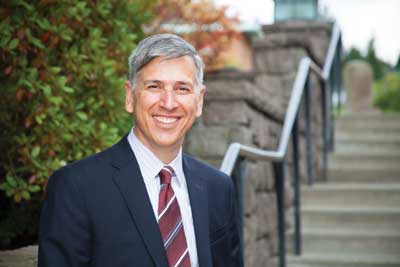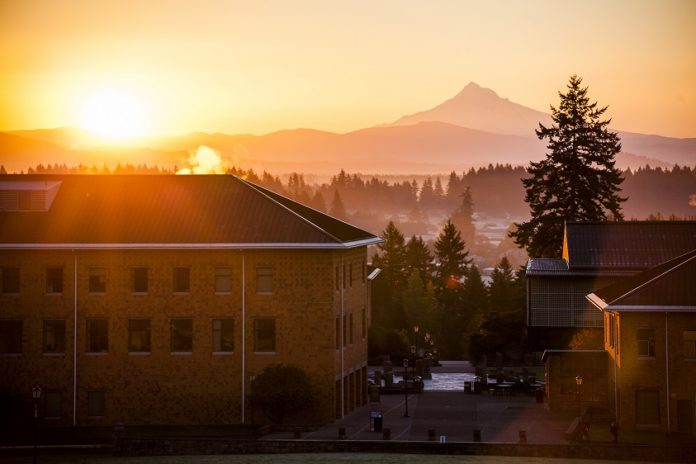Setting goals is one thing, but yet another to carry them out. That’s why the team putting together a new five-year strategic plan for Washington State University Vancouver designed an ongoing way to track progress.
 “From the day we started talking about the expiration of the current goals, there was a commitment to fund the new goals, use them and not just set them on a shelf,” said Mel Netzhammer, WSUV Chancellor. “We really pushed that commitment as we went through the process.”
“From the day we started talking about the expiration of the current goals, there was a commitment to fund the new goals, use them and not just set them on a shelf,” said Mel Netzhammer, WSUV Chancellor. “We really pushed that commitment as we went through the process.”
Now, WSUV faculty and staff are ready to move ahead over the next five years to expand the university’s research and innovation efforts, further diversity and grow the student body and continue to enhance and build community relationships that will, among other things, support regional economic growth.
To that end, WSUV has added a master’s degree in electrical engineering intended to further support the region’s tech sector. It also won approval for four new majors including a new Entrepreneurship major within the university’s Carson College of Business. Growing interest in regional water issues has prompted new research into coastal environmental concerns and stormwater management.
“Part of my personal passion in coming to WSUV was the community engagement piece,” said Netzhammer, 57, who now is completing his fifth year as chancellor.
Job preparation, he said, is an important part of what a university needs to concern itself with, but a good college education is more than just landing a job.
“We want our students to have a rich life… part of that is about a successful career, but it’s also about citizenship, responsibility and appreciation for the world around them.”
Growing contribution
Founded in 1989 as part of the Pullman-based Washington State University six-branch campus system, WSU Vancouver offers 20 bachelor’s degrees, eight master’s degrees and three doctorates. Its faculty totals 200, including 125 tenured professors. The student body has climbed to 3,426.
With an average age of 26, many transfer students are married with families and a part-time job. With the introduction of freshman and sophomore classes in recent years, the WSUV student profile is starting to change.
In the past, two-thirds of students were upper division transfers. That ratio is expected to change to 55 percent transfers and 45 percent freshmen/sophomores as more Southwest Washington high school grads start their college experience at WSUV.
Capitalizing on the future
To capitalize on new and evolving regional opportunities, the WSUV campus will see construction within four years of a new $59 million life sciences building that will support the area’s growing biotech industry. The 72,000-square-foot building also will create new and larger space for teaching and research labs now located around the campus in other buildings.
“This [new building] will give us the possibility of a home for medical school students enrolled in the WSU Elson S. Floyd College of Medicine based in Spokane,” Netzhammer said. Medical students will complete two years of study in Spokane but do their third and fourth years in clinical campuses across the state, he said.
Tracking goals
To ensure WSUV meets its new strategic goals, funding is in place from current resources to support work over the next two years, Netzhammer said.
“We are going to measure our progress and success in big ways and little ways,” he said. A goal oversight committee will meet monthly to keep things moving forward.
People assigned as “leads” for each goal will meet once a semester and use benchmarks to track progress.
While there are multiple challenges in reaching these goals, Netzhammer is optimistic that an improving economy will mean more students can afford to go to college without taking on debt and that area businesses will be in a better position to partner with the university to help employees attain degrees and do research projects.
“Our responsibility is to minimize the challenges and capitalize on the opportunities,” he said.
Campus profile:
2016 Enrollment: 3,426
Total faculty: 200
Average class size: 20
Annual operating budget: $40 million
2016 graduates: 975
Chancellor: Mel Netzhammer
Location: 351 acres, 14204 NE Salmon Creek Ave., Vancouver
WSU Vancouver’s strategic goals (2016-2021)
- Advance excellence in research and innovation
- Champion student learning
- Grow and enhance WSUV student body
- Promote an ethical and socially just society
- Collaborate with community partners







